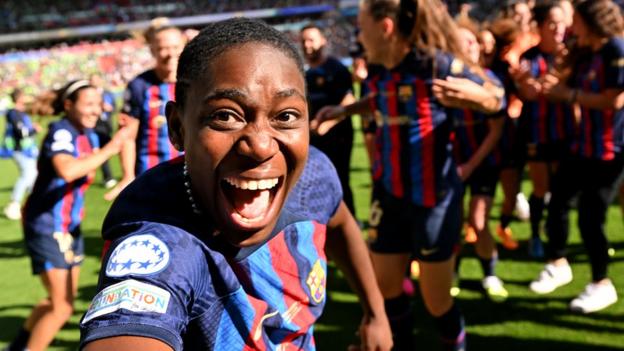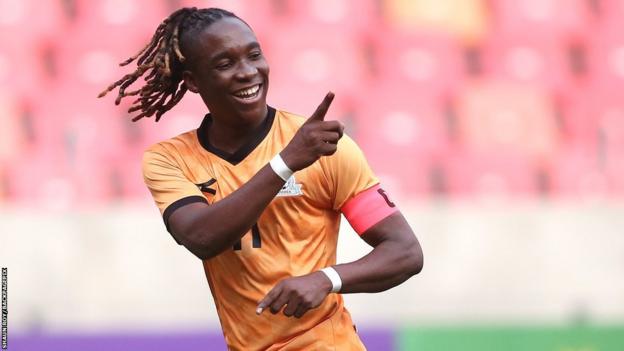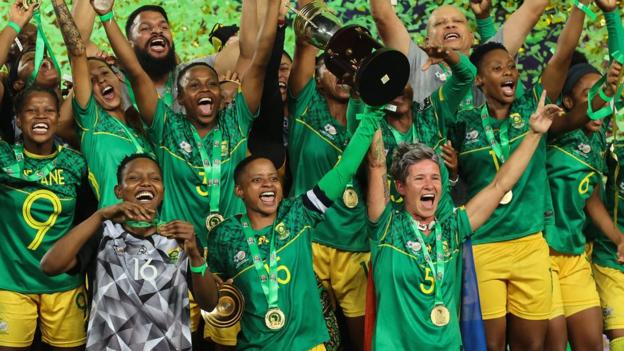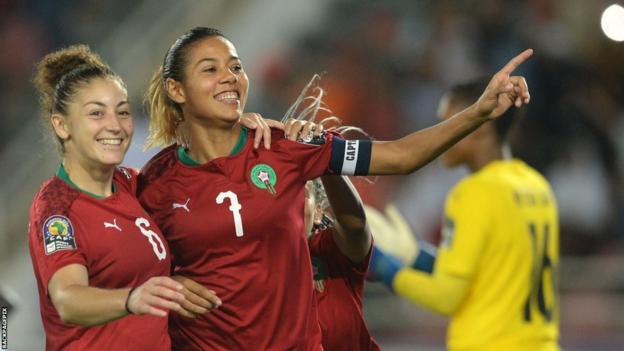The Women’s World Cup gets underway on 20 July, when both co-hosts – Australia and New Zealand – play their opening games.
Africa will field four teams at the finals for the first time, after world governing body Fifa expanded the tournament from 24 to 32 teams.
Reigning continental champions South Africa will be joined by Nigeria, who boast nine African titles, and World Cup debutants Morocco and Zambia at the month-long tournament which ends on 20 August.
Ahead of an event where Africa has yet to break the quarter-final barrier, BBC Sport Africa profiles four key players for the continent’s representatives.

Asisat Oshoala – Nigeria
There is no player bigger in African women’s football than Oshoala – and for good reason.
After exploding onto the international scene in 2014 when she was top scorer and best player at the Under-20 World Cup, Oshoala has consistently been one of the continent’s top players.
Having won three Women’s Africa Cup of Nations (Wafcon), and been player of the tournament at two of them, she has also scored at both the 2015 and 2019 World Cups.
If she nets in this edition, she will become the first African to score at three Women’s World Cups and may well add a record-extending sixth African Women’s Footballer of the Year award to her growing trophy cabinet.
The Barcelona star comes into the World Cup after a fourth successive season hitting over 20 goals and a second straight year as top scorer for the reigning European champions.
On her day, very few defenders can cope with Oshoala, given she is the complete forward able to dominate with her strength and pace, but it’s her intelligent movement both on and off the ball that makes her stand out.
Ruled out of last year’s Wafcon with a knee injury picked up in the opening match, she missed May’s Champions League final triumph with a hamstring injury as Barca defeated Wolfsburg, so Nigerians will hope she stays fit.
Barbra Banda – Zambia

Another who missed Wafcon, 23-year-old Banda is one of the most exciting talents in Africa.
The striker shocked the world in 2021 when scoring back-to-back hat-tricks at the Olympics – the first player to do so in the event’s long history – prior to Zambia’s group stage exit.
Yet Banda’s development stalled last year when she was ruled out of Wafcon – on the eve of the tournament – after a gender eligibility row.
Despite the setback, captain Banda showed her impressive leadership skills and stayed in Morocco to lead her team to an historic third-place finish from the sidelines.
Fortunately for Banda and Zambia, she has since been given the green light to play and returned with frightening ease, scoring 10 goals in five games during September’s Cosafa Cup.
As debutants, Zambia are likely to play defensively and counter-attack, and in Banda, whose searing pace can leave centre-backs for dust, they have one of the best in the business at playing on the break.
Having struck up a partnership with Racheal Kundananji, who bagged 25 goals in the Spanish top flight last season, the pair could form one of the most lethal attacks in Australia and New Zealand.

Refiloe Jane – South Africa
Jane is perhaps this list’s most understated player, but arguably the most important to her team given the diminutive midfielder is the heartbeat of the African champions.
Central to the type of football that coach Desiree Ellis wants to play, Jane is a deep-lying playmaker for Banyana Banyana.
Sitting in front of the defence, she has a terrific passing range and controls the tempo of matches from deep, allowing South Africa’s attacking talent to flourish.
Having made her competitive debut at the 2012 Olympics, Jane has featured for South Africa in every major tournament since, racking up over 100 caps.
Last year, she stepped up to co-captaining the side alongside long-time skipper Janine van Wyk – leading the side to its first Wafcon title against Morocco – but will now be the sole captain with Van Wyk out injured.
It will be a familiar return to Australia, where Jane signed her first professional contract with W League side Canberra United in 2019 before moving to Italy where she now plays for Sassuolo (after a spell with Milan).
While she is unlikely to score many goals or grab any headlines, Jane will be central to South Africa’s hopes as they contest the tournament for the second time.
Ghizlane Chebbak – Morocco

While South Africa and Nigeria dominated headlines at last year’s Wafcon, hosts Morocco truly shocked the world as they reached their first final – with Ghizlane Chebbak the star of the show.
The daughter of former men’s international Larbi Chebbak, a Cup of Nations winner in 1976, Ghizlane captained the Atlas Lionesses in their first appearance at the tournament for 20 years, a run which led to their first World Cup qualification.
Leading from the front, Chebbak ended Wafcon as both joint top scorer and player of the tournament.
Despite being a midfielder, Chebbak is a natural goalscorer. Already her country’s record scorer, she recently notched up a fifth season topping the scoring charts in Morocco’s top division, where she has won ten straight titles with AS FAR.
In November, she led the club to their first African Champions League title, beating holders Mamelodi Sundowns in the final.
Chebbak is also a superb set-piece specialist, and whether it be a free-kick, corner or penalty, she rarely gets her delivery wrong, something which may prove invaluable for the debutants.
Often played as a number 10 or in a midfield three, Chebbak is the Atlas Lionesses’ creative hub, with everything passing through her.
While she may not possess tremendous pace, her technique and decision-making in the final third make her shine.
Source: BBC




No comments:
Post a Comment
Note: only a member of this blog may post a comment.